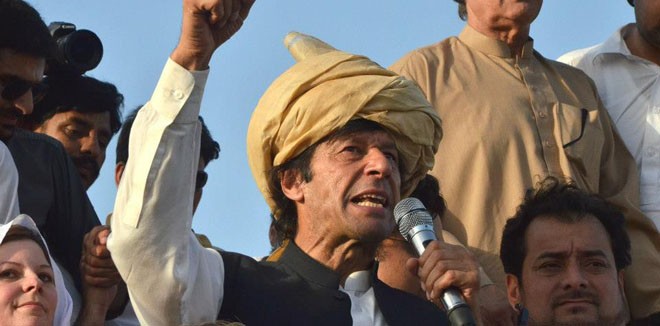

Pakistan Tehreek-e-Insaf (PTI) bagged an astonishing 7.7 million votes in the 2013 general elections. This was enough to make it the second highest vote-getter nationally after Nawaz Sharif’s PML-N, beating Asif Zardari’s PPP into the third place, becoming the third largest party in the National Assembly, and forming the government in Khyber Pakhtunkhwa province.
The party, however, felt cheated, expecting a much better showing, resulting in Imran Khan becoming the prime minister to deliver on its singularly resonant promise of "change" that would free the country of inertia on the road to peace and good governance. The PML-N and PPP ended up banding together to deny Imran even the consolation prize of being the leader of the opposition in the National Assembly.
But Imran is back in contention with a game changer. His persistent narrative insisting on the state talking rather than fighting the Taliban into the way of peace has forced the much-derided and virtually abandoned option of talks with the Taliban from the jaws of imminent military action and onto the centre stage, instead.
However, the chairman of PTI has done something he would never have when he was on the cricket field -- gone to the pavilion just when he was handed to deliver on the death overs. When the Taliban, benefiting from Imran’s support to their dubious argument of being a stakeholder in the state’s fate, named him on their committee to hold talks with the government, he excused himself.
In short, he brought everyone to the table but skipped the seat at the proceedings, leaving others to share the blame.
Doctrine of dichotomy
Imran and his party’s convincing argument that he was the head of his own political party and, hence, could not possibly represent the Taliban is acceptable. But it is a bit self-serving that PTI and its chairman failed to extend the same logic to the fact that the Taliban also nominated leaders of Munawar Hassan’s JI, Fazlur Rehman’s JUI-F and Samiul Haq’s JUI-S to its team -- there was no advice from Imran to either the Taliban or these parties to also not represent the Taliban.
By the same yardstick, if he has no objection to them being Taliban’s representatives, how could he not ‘help’ the talks process by nominating a deputy to the Taliban team, if he was queasy about being on it himself?
This dichotomy of asking for something in defiance of pluralism but refusing to take charge of delivering on the responsibility of adopting risky initiatives articulated is central to Imran and his party’s politics, including on terrorism.
Any military action will have to be supported by not just the federal but also provincial governments, especially Khyber Pakhtunkhwa’s where PTI governs, which would mean that Imran’s support is tantamount to being a game changer but Imran has been anything but game, frustrating federal parliamentary consensus.
It was Imran who forced an APC on talks when a majority in the parliament wanted action against the Taliban. It was Imran who then refused to attend the APC unless briefed personally by the army chief. It was Imran who droned on about drones killing the reluctant APC consensus on talks when the Taliban went on an especially vicious killing spree in the last few weeks instead of condemning the Taliban by name for the vicious rebellion. He has never asked Taliban to hold fire -- he has only been demanding the state to do so.
Reward without responsibility
So, when he forced a U-turn on the federal government’s apparent decision to take the fight to the Taliban, a day before the prime minister took to the rostrum in the National Assembly last week, he was expected to assume responsibility for the talks in direct proportion to his overbearance and his image of being the ‘captain.’
That he would promptly refuse his nomination to their team by the Taliban was predictable. It was in keeping with his politics of demanding change but passing on the responsibility of change to others.
He and his party have no qualms in embracing contradictions -- the PTI core committee that declined Imran being on the Taliban team called for talks to be under the ambit of the constitution. And yet, under the constitution, private armed groups are banned. And Taliban have been declared a terrorist organisation by the state. The party also said Taliban did not consult PTI before naming Imran. So, are we to assume the Taliban consults them before their bloody attacks?
The fact of the matter is that among the non-religious parties, the PTI is the only one that has not favoured crushing the terror groups that attack the state and its citizens. Its policy is underpinned by appeasement and capitulation. This, in Imran’s estimation, is a less messy, more feasible option to taking actual responsibility and paying the inevitable higher price for peace by opting for a long-term solution.
There can be only two explanations for Imran’s politics of bipolarity -- running with the hare and hunting with the hound.
Either he is too scared to opt for a path that will bring with it a lot of pain and loss for which his party is not ready or that he is what many suspect -- a genuine sympathiser of the Taliban who represent for him a better way to sidestep the messiness of politics that does not offer the same certainties as does cricket and that aligning himself with them buys him more influence than the prime minister does. He is the captain that does not lead from the front. He wants the reward but not the responsibility.